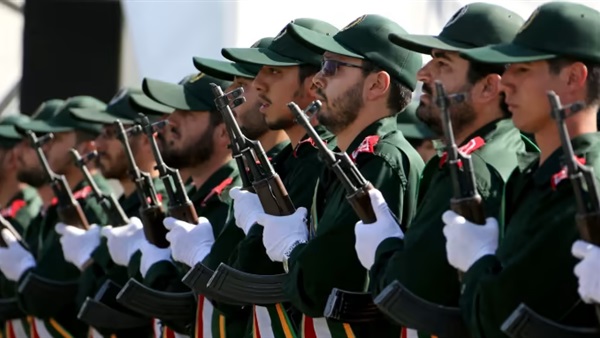UK weighs designating Iran’s Revolutionary Guards a terrorist organisation

Foreign secretary James Cleverly says Tehran will be ‘held
to account’ after execution of Iranian-British man
UK foreign secretary James Cleverly on Monday warned the
Iranian government it would be “held to account” for the execution of former
senior regime official Alireza Akbari, an Iranian-British dual national,
describing his death as a “cowardly and shameful act”.
His warning comes as the UK conducts a review to decide
whether to designate Iran’s elite Revolutionary Guards, the most powerful wing
of its military, a terrorist organisation in a sign of Britain’s hardening
stance towards the Islamic republic.
The review was launched before Akbari was hanged on charges
of spying for MI6, Britain’s security service, but it may strengthen the case
of Iran hawks in the UK government.
Cleverly told MPs that they “should be in no doubt that we
are witnessing the vengeful actions of a weakened and isolated regime obsessed
with suppressing its own people, debilitated by its own fear of losing power
and wrecking its international reputation”.
A British official said the review was initiated by the Home
Office, adding that no final decision had been taken as there was debate within
the government over how to proceed.
It is highly unusual for a government to designate another
state’s military a terrorist organisation and the UK will have to weigh the
risks and rewards of any such action.
There is nervousness in the Foreign, Commonwealth and
Development Office about proscribing the Revolutionary Guards because of the
risk of retaliation by Tehran against UK-Iranian dual nationals in the country,
according to officials briefed on the internal discussions. FCDO insiders said
it was unlikely any decision was imminent.
A proscription would further escalate tensions between London
and Tehran and risked triggering retaliatory measures from the Islamic
republic, analysts said. It would also complicate any future hopes of reviving
diplomatic efforts to save the moribund 2015 nuclear accord that Iran signed
with world powers. As one of three European signatories to the deal, Britain
has been central to the diplomacy.
But the UK has also become increasingly concerned by Iranian
threats to individuals, including journalists, in Britain. In November, Ken
McCallum, director-general of MI5, Britain’s domestic intelligence agency,
warned that Iran projects a “threat to the UK directly, through its aggressive
intelligence services”.
“At its sharpest this includes ambitions to kidnap or even
kill British or UK-based individuals perceived as enemies of the regime,” he
said.
The same month, Iran International, a London-based satellite
TV network considered by many Iranians to be an opposition channel, said some
of its journalists had received credible threats to their lives from the
Islamic republic.
Relations between Britain and Iran have been strained for
months as the UK has joined other western states in condemning Iran’s crackdown
on nationwide protests that erupted in September after the death of a young
woman, Mahsa Amini, in police custody, as well as Tehran’s decision to sell
armed drones to Russia for deployment in the war with Ukraine.
The 120,000-strong Revolutionary Guards Corps was
established after the 1979 Islamic revolution in parallel to the conventional
army to protect the republic from domestic and foreign threats.
Former US president Donald Trump designated the guards a
terrorist organisation in April 2019, a year after he unilaterally withdrew
from the nuclear accord Tehran signed with world powers.
The designation stoked tensions across the Middle East. In
the months following the decision, the US blamed Iran for sabotage attacks on
tankers in the Gulf and for a sophisticated missile and drone assault on Saudi
Arabia later that year that temporarily knocked out half the kingdom’s oil
output.
At the time, the UK and other European powers opposed
Trump’s “maximum pressure” campaign against Iran, fearing it would lead to
greater instability in the region and derail attempts to save the nuclear
accord.
But diplomatic efforts to revive the nuclear deal have been
stalled for months, as the UK and other western powers strongly criticised
Iran’s crackdown on protesters.
Sanam Vakil, an Iran expert at Chatham House, said because
the guards were a “critical economic and security player with a constitutional
mandate to protect the regime’s internal and external security interests, a UK
proscription would likely result in a break of diplomatic ties”.
“This would result in escalation of tensions to levels not
seen since 2011, which was the last time ties were cut,” she added.“Depending
on whether other countries follow suit, we should expect Tehran to employ a
pattern of escalation in the Gulf region similar to what was rolled out in
2019.”









